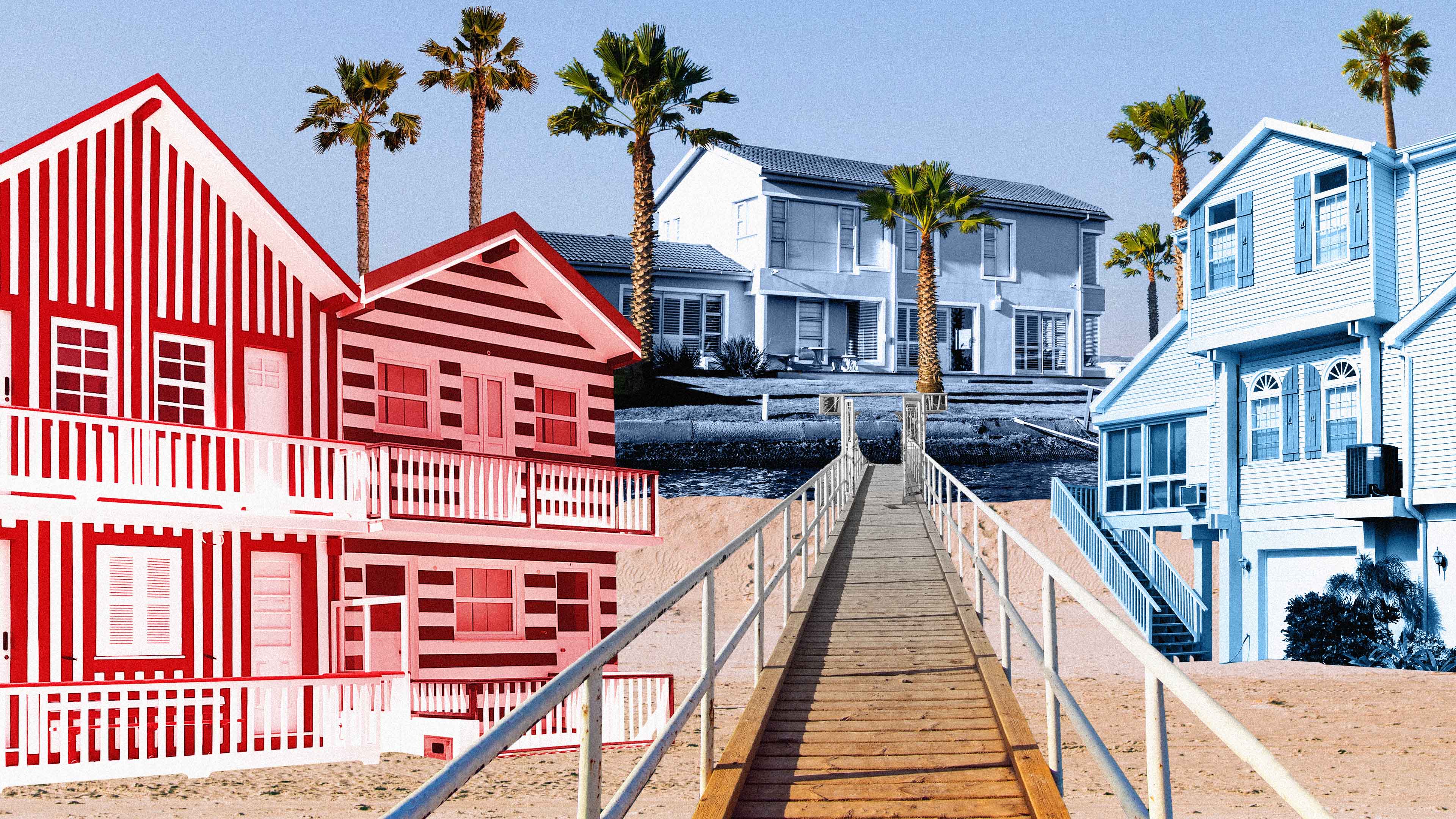
The early 2010s was a more innocent time, when young tech upstart Airbnb offered a convenient and moderately priced alternative to the stuffiness of a hotel.
You could book an apartment in the old town of just about any European city without worrying about contributing to rent increases that are forcing families out of neighbourhoods they’ve lived in for years.
How the world has changed. Grumblings were already evident by the mid-2010s but, after COVID-19, an insatiable hunger for travel paired with the rise of Insta-tourism has turbocharged holiday lets and made their ubiquity in some hotspots impossible to ignore.
Tackling the displacement of local people, who sometimes find themselves priced out of their hometowns because of the profits property owners can accrue from short-term lets, has become a political hot potato. Modus has previously reported on several cities which were tackling short-term lets (Airbnb, Vrbo and Booking.com being the largest platforms to advertise them) and second homes, as they attempt to balance the needs of the tourism industry and the local population. So, have these measures been effective and were they always necessary?
“There was always a market in vacation rentals but Airbnb was successful in creating a market where it didn’t exist before,” says Murray Cox of InsideAirbnb, a project that analyses Airbnb data to look at the company’s impact on communities. “It was so easy to change a property into an urban hotel at the tap of a button.”
The data maps that the group has developed are a sea of dots showing the astonishing extent to which many popular tourist destinations have been flooded by Airbnb rentals. Entire properties in many locations make up more than 80% of the market, giving lie to the official line that Airbnb and similar platforms are part of the sharing economy.
Pushing back against unchecked Airbnb
To try and rebalance the property market, many jurisdictions have gone in hard on short-term rentals and holiday homes. Measures include demanding licences to offer short lets, stipulating an annual cap on the maximum number of nights the property can be rented and introducing punitive taxes for additional homes. Only some of these locations have managed any pushback against what many local people regard as a scourge that has, they believed, priced them out and enabled over-tourism.
Since 2023, in New York City, for example, Local Law 18 has meant that all property owners wishing to offer short-term lets must be registered and must be present during their guests’ stay. This effectively wipes out the ‘whole apartment’ model of holiday lets which has become the most popular form of rental. Crucially, platforms are legally obliged to check licenses are in place to process payments. As a result, the number of these lets has plummeted – Cox estimates by about 90%.
Barcelona, which has long been the focus of a backlash against over-tourism, was one of the first European cities to outlaw short lets aggressively. In 2014 the city authority stopped issuing new short-let licences meaning that the only way to acquire an apartment for short lets was to buy one already licensed. The punishment for renting out an unlicensed property was a fine of up to €600,000 ($705,000). Earlier this year, the city won a court case to go even further and ban short lets entirely by 2028, a move which the mayor says will return about 10,000 properties to the long-term rental sector. (In May, the Spanish government also compelled Airbnb to remove 65,000 illegal lets, across the country, from its platform.)
In Paris, the laws have been tightened so that only primary residences can be rented and initially only for fewer than 120 nights per year, falling to 90 nights this year. The owners must register their properties with the authorities meaning that additional homes cannot be rented at all. Not following the rules leaves property owners open to fines of up to €100,000 for repeat offenders. The fines are being enforced too – €380,000 was collected just in January and February of this year, in a city where short let properties have fallen by at least a quarter since the measures were introduced.
Although many cities have similar disincentives – the limit on maximum number of nights is particularly popular – New York, Barcelona and Paris have been the most successful at pushing down Airbnb numbers because, crucially, they have invested in enforcement measures. Paris, for example, has a specialist team that actively looks for illegal Airbnb-style properties.
“Frustration with tourism is becoming very clear around the world, but what is less well publicised is the benefit from tourism” Nick Maclean FRICS, Acting President of RICS
Has it worked?
But does the evidence show that outlawing short-term lets and associated second homes is economically beneficial? If you are a hotelier, then yes, you’re quids in: room rates in New York hit a record high, north of $400 per night on average last year. Yet, despite the (theoretical) release of many thousands of apartments onto the long-term rental market, rents have not fallen in New York – in fact they have risen significantly in Manhattan, which had the highest concentration of Airbnbs. They have also risen in Edinburgh, which cracked down on short lets, as well as Paris and Barcelona which are the most expensive cities in their respective countries in which to rent.
This may be because some of the properties no longer operating as short-term lets were never let on the general market anyway. But while Airbnb and second homes are a visible symptom of the commodification of property and have certainly played a part in increasingly unstable and costly housing markets, they are not as significant in various cities’ housing crises as has been claimed.
“Interference in market dynamics rarely works or addresses target issues and can lead to unexpected consequences,” says Nick Maclean FRICS, Acting President of RICS. “We see authorities around the world reversing well-intentioned interventions.”
One example is Berlin, which in 2016 introduced ‘Zweckentfremdungsverbot’, a law targeting short-term lets. By 2018, the German capital was relaxing the rules after negotiations with Airbnb. The city decided it wanted to drive out the corporate short-let hosts but could tolerate those doing it on a more individual basis. Inside Airbnb’s Cox points out that the platform is a $75bn company that uses some of its profits to lobby governments as well as retaining a pugnacious legal team.
Nick Gallent FRICS, professor of housing and planning at University College London, has little time for short-term lets, calling them a form of “digital rent extraction that maximises [the amount] that can be extracted”. He does, however, feel there is a balance to be had with second homes.
“In some rural locations where there’s been a decline, second home owners can bring investment” Nick Gallent FRICS, University College London
Rural Wales where, during the 1980s and 90s, there was a notorious bombing campaign against second-homers, introduced a 300% council tax premium for second-home owners in order to free up housing stock in a region which is among the most unaffordable in the United Kingdom. Gallent notes that while the tax was popular among local people, it has not had entirely beneficial consequences.
“It’s a pretty significant rise, especially for people who have had property in Wales for a long time,” he says. “It has caused some buyers to sell up and there’s now an increase in availability in some areas. Pembrokeshire [council] enacted the full 300% but then rowed back [reducing the premium to 200%] because there weren’t buyers for these properties and there was a lengthening list of empty [holiday] houses. There is a tourism sector in Wales and it’s not a sensible economic strategy to price it out.”
Having studied the sector for many years, Gallent concludes that tourism and second-home ownership can, in certain circumstances, bring benefits. “In some rural locations where there’s been a decline, second home owners can bring investment, they provide income through building and maintenance.” Models such as the €1 home initiatives available in some parts of southern Europe would be good examples of this attempt to make hollowed-out communities more economically active by bringing in wealthier outsiders.
The problem, he suggests – and the tightening rental markets in cities which have successfully clamped down on short lets supports this – is a lack of homes. “Our end game should be to increase affordability over the long-term through rent controls and building more social housing.”
Maclean also emphasises that the “fundamental problem is the delivery of new homes. Resident frustration with tourism is becoming very clear around the world, but what is less well publicised is the benefit from tourism and investment capital. Work must be done in balancing this frustration with information about what money coming into an area can really achieve.”
While Cox would also agree that we need more housing, he is less persuaded about the benefits of mass tourism. His solution is to avoid short lets and, if that means you can’t afford a hotel in a particular destination, think about going on holiday somewhere else. “My concept of sustainable travel includes thinking about where you’re staying and what impact that has on the community.”


